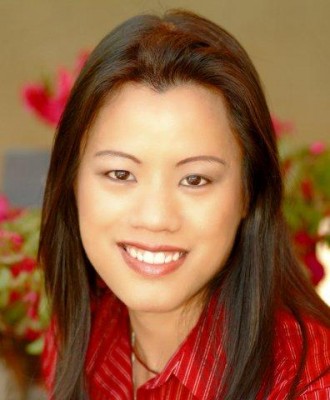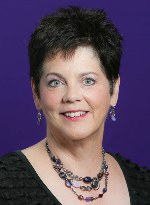By Janie Magruder
GCU News Bureau
In five words, Maria Quimba provides a head-to-toe diagnosis of her life, an adventure from the beginning that shows no signs of being tamed, and her career, which is on a trajectory similar to the mountains she has scaled: curious, passionate, introverted, risk taker.
The symptoms are numerous:
Quimba wonders why pi is pi (and watches Ted-Ed for illumination). She builds time into a schedule as packed as Mr. and Mrs. Howell’s suitcase on “Gilligan’s Island” to soothe people worn down by life. She’s a non-hobnobber who forced herself into public speaking at the risk, literally, of losing her lunch. And while river-rafting down the Pacuare River in Costa Rica, she calmly ignored the boa constrictor dangling above, a small price to pay for taking in the other wildlife around her.
Quimba, assistant dean of professional studies programs in Grand Canyon University’s College of Nursing and Health Care Professions, has a fever for learning and teaching, dreaming and innovating, caring and inspiring. And in nursing education and leadership circles, she’s a hot property.
On Thursday, she was honored by the Phoenix Business Journal as one of the top 40 leaders under age 40 (Quimba is 37) in the metropolitan area. Each honoree was celebrated for provoking, motivating, challenging and encouraging the business community.
On Friday, Quimba was recognized as the regional winner in the Nurse.com Nursing Excellence GEM (Giving Excellence Meaning) Awards in the category of Advancing and Leading the Profession. The awards go to nurses who are “well-known and respected as a visionary, innovative leader and change agent, who move the profession forward through work in patient care administration, education or research, or strengthen it through other professional activities, endeavors or contributions.” She will advance to the National Nurse of the Year awards in the fall.
“She’s unstoppable,” says Dr. Marla Weston, CEO of the American Nurses Association. “And there’s something magnificent about her not getting stopped by the reasonable, and in fact, doing things that seem unreasonable when they are the right things to do.
“I love that she’s a nurse leader, but ... she also is a powerful woman under the age of 40 who is going to serve Phoenix and Arizona incredibly well (and that) is bigger than nursing,” Weston says.
Shaped by nature and nurture
Quimba was born in Manila in 1976, the eldest of three girls whose mother was a pharmacist and father was a civilian military contractor. Her earliest memory is organizing empty vials and beakers in her mother’s lab.
Because of her father’s job, the family moved around, and Quimba, who learned English by watching television (her native language is Filipino), had lived in and traveled to dozens of places around the world by age 16. She never has forgotten her privileged upbringing.
“In the Philippines, filled with millions of people who have virtually nothing, I was born into a wealthy family,” she says. “But I recognize that it easily could have been a different situation for me. I try to remember that, when you have been given so much, it’s your obligation to do for others.”
Her mother, Nina, arranged for her daughters to spend most holidays and summer vacations visiting orphans at monasteries and working in soup kitchens and homeless shelters. They rarely gave one another gifts and, to this day, they donate to various causes in lieu of presents.
At 12, Quimba decided to become a nurse. She saw a woman with a newborn baby living under an overpass in Manila, and realized poverty is perpetual.
“Seeing humanity shaped my purpose in life,” Quimba says. “It solidified that my life’s work was to identify ways to directly or indirectly help change people’s life situations.”
Leaving her comfort zone
A year after Quimba and her family came to Arizona in 1993, she graduated from Ironwood High School, then was accepted at age 16 into the University of Arizona’s highly ranked nursing school. With her major coursework completed in two years, Quimba explored classes in art, theology, sociology and history. She worked in enrollment for the U of A, addressing family members of first-generation Native American and Asian-American students at risk of not succeeding in college.
Quimba preferred one-on-one problem-solving sessions, but she knew she needed to stretch her wings in public.
“I had never spoken in front of an audience until I spoke at an enrollment event before 300 families, and I remember thinking, ‘I’m going to throw up onstage,’” she says. “But I found my niche. It was a joy to be able to help the students figure out they were in the right place.”
One summer, Quimba was a nursing assistant at a Maryland hospital and experienced a trauma that shaped her perception of patient care and advocacy. She witnessed a nurse attempt to smother an elderly, chronically ill man, and she intervened, reported it and testified in court. Quimba was 19.
“People need a voice, and you have a choice – you can say nothing and do nothing, or you can choose to help,” she says. “What if you are the only safety net between a person and others? What if I had done nothing and this nurse decided it was OK to do it again? I want my students to understand the enormity of their responsibility, but also the impact they can have, even one person at a time.”
Quimba graduated with a bachelor’s degree in nursing in 1998 and soon had three job offers, including one from John C. Lincoln Deer Valley Hospital.
Perfecting the art of risk taking
Quimba is passionate about travel. She has bobsledded in the Swiss Alps, lived in a tree house above the Amazon River and climbed Machu Picchu. Her favorite place is Costa Rica because of its rain forests, variety of wildlife and solitude.
In some ways, Quimba’s career as a nurse has been just as adventuresome: She was rejected by an older patient for being too young. She once ducked a flying bedpan. She lived to tell about the time she calmly removed from the hands of an elderly, demented patient the calipers (think scissors, only sharper) that had been sneaked from Quimba’s lab coat.
Three years into her career, Quimba returned to school, but she eschewed the traditional master of nursing and instead pursued a bioethics degree, working days at John C. Lincoln and taking evening classes from Midwestern University. The courses expanded her knowledge of justice and global view of health literacy and quality-of-life issues.
Quimba then moved into teaching, through a nursing program at John C. Lincoln with Maricopa Community Colleges. Her foray into curriculum and program development came next, with Dr. Anne McNamara, who had not yet joined GCU as dean of the College of Nursing. McNamara was creating a nontraditional program focused on competency and skill-based nursing at Rio Salado Community College and asked Quimba to help.
“For people who wanted a second degree or to get into a nursing program but were faced with all these barriers and waiting lists, this gave them more access,” says Quimba, who also built partnerships with hospitals and in rural communities to further expand that pathway.
Diving in at GCU
When McNamara arrived at GCU in 2007, she recruited Quimba to oversee the career development of nurses and set the pace for health care education. Her first assignment: Audit a school in the Caribbean that was affiliated with GCU. She found it woefully inadequate, the students unprepared and in serious debt. Quimba’s solution was to bring the students to Phoenix, enroll them in an intensive, extended program, and provide tutors and on-campus housing – on GCU’s dime. All 18 students earned their nursing pins and entered the profession.
Her own thirst for knowledge continued. Quimba earned master’s degrees in nursing and business administration from GCU, and she currently is working on a Ph.D. in nursing education from the University of Northern Colorado.
Today at GCU, she directs strategic growth and development of professional studies for more than 6,200 students at four campus locations and 46 affiliate sites in 27 states, and she manages some 450 faculty members.
Quimba helped forge partnerships with Banner Health, which has brought GCU’s robust nursing programs into its hospitals, among other influential health care groups. She created a program to inspire tomorrow’s nurses to continue their education and eventually become tomorrow’s educators by incorporating graduate-level studies into undergraduate programs. She directed the creation of a virtual hospital, where students make patient-care decisions and collaborate with hospital colleagues, giving them more opportunities to apply their skills.
“My biggest concern is we have too small a pool of prepared nursing professors,” Quimba says. “I would like practitioners not to think, ‘My clinical time is over, I’ll go into education,’ but rather, ‘I love nursing and want to have an impact on future nurses.’”
Chanelle Ison, vice president of operations for GCU’s nursing school, met Quimba five years ago. The pair work closely on policy review, program implementation, family support and student services.
“The thing I have always appreciated about Maria is her ability to think outside the box and really partner with the community to find solutions that make a true impact on the nursing community,” Ison says. “Maria is a visionary when it comes to looking for ways to advance the profession, and she stays connected very well.”
Quimba’s proudest moments always happen before graduation. “It’s when students realize, ‘I’m a player, I’m a change agent because of my education,’” she says. “It’s not the piece of paper, it’s not because they will make more money, it’s not getting a new job, it’s recognizing, ‘I can be more than what I thought. I have a voice.’”
Outside GCU’s walls
Quimba’s devotion to people spreads beyond GCU and nursing. She’s a tenacious volunteer, helping at shelters for victims of domestic violence, human trafficking and mental illness and packing food boxes, listening to single moms or visiting with the elderly at the St. Vincent de Paul center at her church, Ss. Simon and Jude Cathedral in Phoenix.
“Maria is very humble and always makes the other person comfortable,” says Carol Irwin, a fellow volunteer who met Quimba earlier this year. “She’s very accepting – there’s not a bit of judging about her – it’s just the love of the Lord coming out of her.”
Irwin’s husband, John, adds, “You know the minute you talk to her that she understands the poor, the world.”
Quimba’s world is about to expand a bit further. Having rescued several dogs from puppy mills – she currently has Cavalier King Charles Spaniel mixes Buddy, Noodles and Puppy Peanut – Quimba plans to bring into her home children subjected to unspeakable human cruelties. By late fall, she will be a certified foster parent.
“If I had a child, for even a week, a month or a year, I would get the chance to show them there’s a world outside their own, that there are people who will show them affection, that abuse isn’t normal,” she says. “I would love to be able to do that.”
Another label for Quimba – supermom – seems about right.
Contact Janie Magruder at 602.639.8018 or [email protected].






































































